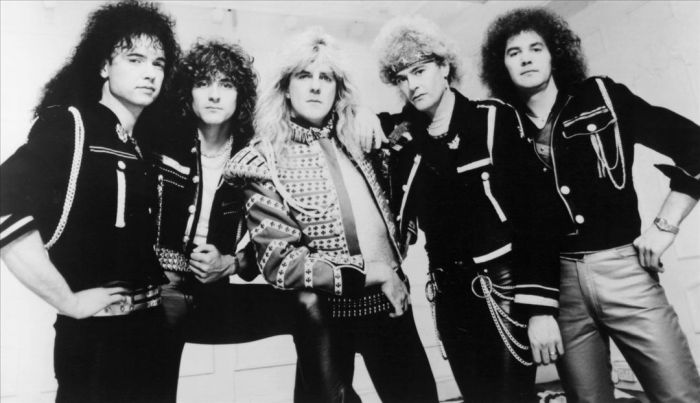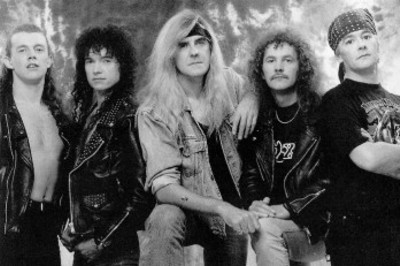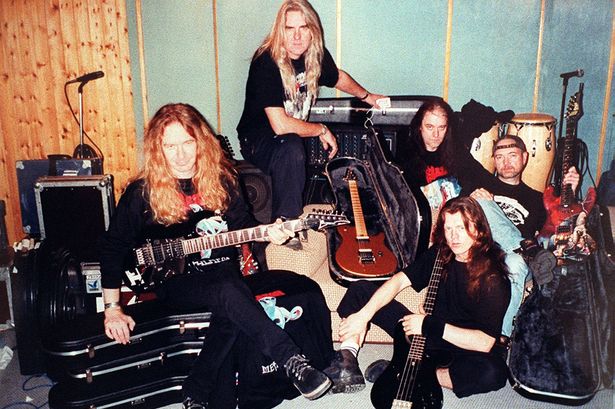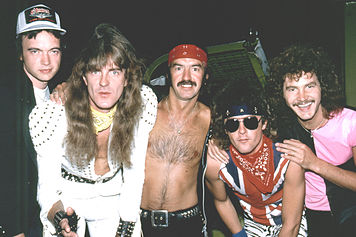
New Wave of British Heavy Metal pioneers Saxon are currently reaching the end of their fortieth birthday world tour. Coming from the same South Yorkshire mining town of Barnsley, I here reflect further upon the band’s roots.
I’ve already written about my first gig experiences in Barnsley and about the formation of Son of a Bitch, later Saxon. Here I offer a full history of the band from the local records.
From the 1960s into the 70s there was a thriving music scene in the South Yorkshire mining town of Barnsley. A variety of venues, from council premises through to pubs and working men’s clubs, put on national, and even international, acts from a range of genres. These included names like Brian Eno, Mud, Alex Harvey, The Real Thing, Nazareth, Fairport Convention and Steeleye Span. This is an impressive roster of names for a moderate sized town sitting between the major concert venues of Sheffield and Leeds and with many other smaller venues in between.
Not only did Barnsley residents listen to music, they responded with their own and the many clubs and pubs were always on the lookout for acts to fill their schedules. Bands could get plenty of live experience, then, and, as a result, Barnsley produced a wealth of live acts and two groups who went on to gain national and international status of their own: Son of a Bitch (who subsequently became Saxon) and goth band Danse Society.
Formation
Son of a Bitch, as is often the case, went through several configurations and name changes before they came together in late 1975 in the first line-up that would be recognised by later Saxon fans. Members had been playing together or in other local bands since about 1970, performing as Coast, The Iron Mad Wilkinson Band, Son of a Bitch, Pagan Chorus and Blue Condition.
Peter ‘Biff’ Byford was originally from Honley, West Yorkshire. After a spell down the pit at Flockton, he started playing in rock bands as a hobby, first as guitarist, later as bassist and then vocalist. After leaving the seven piece Iron Mad Wilkinson (who supported Suzi Quattro in Barnsley in 1973), he formed three piece Coast with guitarist Chris Morris and drummer Dodd. Morris the guitarist had formerly played in a nightclub cabaret band called Dusty in Huddersfield, but had grown tired of endlessly playing the Four Tops.
Coast
Coast were ambitious and they had a keen eye for self-publicity. On January 30th 1974 the pub venue Changes in Barnsley announced the “return of the sensational Coast.” The band appeared again “by popular demand” within a week and played there eight times during that year. They also found slots supporting Cockney Rebel and Be Bop Deluxe at the town’s Civic Hall in June, at an outdoor festival in Sheffield’s Parson’s Cross Park and supporting Be Bop Deluxe again at the Civic in December. Coast played several solo gigs around the town as well. Their live appearances always got good reviews. For example at the Cockney Rebel gig the band were complimented on their vocals- “unusually high quality, smooth and refined, not gritty and tinny.” They made a “triumphant return” in front of a “jubilant crowd” at the Barnsley’s Centenary Rooms in September, assailing the audience with “a mind blowing barrage of light and sound.” (NB The support at this gig was from Trace, whose rhythm guitarist was Tony Whitaker. His younger brother was to play guitar in Nightmare and Trace’s first gig at Broadway School’s main hall is recalled in my novel Freak or smoothy?)
The future looked promising for Coast during 1974. They won the semi-final of the Tetley brewery Sound of the North contest in March and proceeded to the final hopeful of the prize of £600 of equipment and the chance of a recording contract. As it turned out, they came fourth at the final, although Morris won £50 in recognition of his guitar skills. The competition had been good publicity, though, and another feature appeared in the local paper in which the band announced that they were seeking a manager to handle their bookings. They were touring colleges and universities nationally, as well as their ‘resident band’ status at Changes, and they had a tour of Holland lined up; they needed someone to handle all the admin work. Despite this plea for help, it’s obvious that someone in Coast had very good contacts with a local journalist and knew what could make an interesting story which would get coverage.
However, there was a set back. Morris left the band in July and a replacement had to be recruited. Byford had met guitarist Paul Quinn after the latter’s band, Pagan Chorus, had played Club Baba in Barnsley (the town’s premier night spot). Chorus billed themselves as ‘cabaret style pop’ (whatever that genre entailed) and having heard them Byford suggested to Quinn that they could both do better. He joined Coast.
In February 1975 the Barnsley Chronicle reported that Coast had been recording a new cassette of songs at Holy Ground studio in Wakefield (this was owned by Bill Nelson of Be Bop Deluxe and the band had plainly built upon the friendship forged when they had supported them in Barnsley). To promote this they were issuing badges, t-shirts and posters bearing the logo ‘Bap shoo ap’, the title of one of their most popular songs. Things did not work out as hoped, however. By April the newspaper was announcing that a new band called Blenheim had been formed, featuring a former Coast member and three ex-members of Trace. The result was that Biff and Paul had to spend the next few months auditioning new members. However by early August they announced the new line up and its first gig at the Victoria Hotel, Cudworth (a former Coast venue). They promised new songs and revamped oldies. A further gig at the Centenary Rooms took place on October 3rd.
SoB form
Finally, late in 1975, Byford and Quinn teamed up with Graham Oliver and Steve Dawson from local rivals Son of a Bitch. The previous line-up of Bitch gigged very regularly in Barnsley. The pub Changes, situated on the edge of the town centre, offered live bands at least once a week and “SOB” played the venue nine times in 1974 and eleven times during 1975. I assume that the capitalised SOB was a discrete abbreviation of the band’s name (certainly the local paper preferred to avoid giving offence by using it). The band hailed from Mexborough and were described after one Barnsley gig in July 1974 as a “good tight, noisy band” who “belted out good solid rock… great.” This was perhaps not the greatest of endorsements, but the reviewer went on to suggest that SoB could “mellow into something really good.” Whether the transformation into Saxon counts as ‘mellowing’ I’m not sure.
In January 1976 Metro Management advertised that “out of the ashes” of the previous bands had come a new Son of a Bitch, who were booked to play their first gig at a small civic venue, the Centenary Rooms, on February 6th 1976. The choice of venue indicates that they were still unsure of their audience, but the band members all had solid live experience and they were confident enough to return within a month (with Fix as support), albeit for only 50p (now about £3.80) on the door. Aged 15, I first saw the band playing at one of these two gigs- I have forgotten which, but it was my first experience of live rock and I remember it as being packed with grown-ups and being smoky, beery and very loud! It felt like my first taste of an exciting, adult world.
The band played their home town regularly after that, although they graduated to the main auditorium of the Civic Hall from June 1976, playing a gig that promised to “make your feet steam” for a mere 65p.
The band appeared in Barnsley nine times over the next thirty nine months. This averages one appearance every three months or so, but in fact five of those gigs were during the first year. It seems apparent that the strategy was to establish a core local audience and to hone the group’s live skills and set at minimal expense, before gambling time and resources on unknown audiences further afield.

Chasing a deal
Bitch were hungry for public exposure as well as live experience and accordingly they agreed some odd appearances and pairings. Usually the band were supported by other local rock outfits- for example, in November 1976 support was provided by Heaven’s Above from Cudworth and Weasel from Mexborough. This was not always the case, however. In July 1976 Bitch again played Barnsley’s Civic Hall, this time (bizarrely) as part of the borough’s ‘Youth Dance Week’. Support surprisingly came from Manchester’s Afro-Caribbean soul band Masterpiece; on another occasion Bitch were supported by a white soul outfit, Kokomo, and at another gig films were shown instead of a live guest act, one being of a live performance by avant garde experimentalist Eno.
The local paper, the Barnsley Chronicle, announced that the July gig proved that “rock lives” (in the face of the birth of punk, presumably). Bitch, “arguably Barnsley’s foremost rock band,” had played to an audience of 300 and had provoked “wild scenes, pandemonium, chaos and cheers.” The report listed the set- it included Freeway, Lift up your eyes, Envy, Taking in the dollar and longstanding favourite Bap shoo ap. The favourite that night, though, was a ballad called Anne Marie. I recall this song, even today. It was a certainly a fave of me and my friends who were in attendance that evening and- at a push- I think I could still play the opening riff, even after four decades.
When the band returned again in November that year the paper declared them to be “possibly the town’s leading band at the moment” and “well on their way to ‘making it’” as they had just distributed demo tapes to record labels. It was, however, to be another two years before Bitch finally found a recording contract.
You can trace the band’s steadily rising profile directly through the pages of the Chronicle. SoB (as the reporters discretely liked to call them) were a local success story the paper was happy to feature, whilst the band plainly recognised the benefits of guaranteed press coverage. Today, acts can promote themselves directly to fans through Facebook, Bandcamp and the like. During the seventies you had to work harder for publicity, but the local paper was very willing to fill column inches with praise.
Another route to recognition, now as then, was through competitions. In late September 1977 Bitch won a local ‘battle of the bands’ heat in Sheffield and were headed for the semi-finals of the US Sound Spectacular in Manchester in October. Perhaps to capitalise on this success, another Barnsley gig was announced and the band set about recording further demo tapes. Nonetheless, it must have been galling and dispiriting for them to see brand new punk outfits getting signed within months of forming whilst SoB– despite their considerable musical and live experience- were still gigging around the working men’s clubs and hunting for a deal.
The punk riot
The November 1977 booking was put in doubt by an event at the same venue in late October. Barnsley’s one and only punk gig ended in an alleged riot and a police raid. In response, a review of the council’s bookings policy was initiated and SoB were caught by this over-reaction. As vocalist Pete Byford told the Chronicle, the “antics of the punk rockers” had threatened all live performances in the town and, before the concert could proceed, the band had been obliged to provide legal undertakings to pay compensation for any damage wrought by the audience. As it was, the gig passed off peacefully, perhaps because the heavy metal fans restricted themselves to drinking Barnsley Bitter and head-banging rather than pogoing…

Recognition
In mid-1978 the Chronicle announced that SoB had finally secured a recording contract. They had been flown over to Paris to sign a five figure deal with Carrere Records and were to begin recording their first album in the near future. Everything seemed promising: in mid-September the local paper reported that the album would be released by Christmas. That said, it had no title, as yet, and there was also talk of the band changing its name too.
A triumphal return to Barnsley Civic Hall took place in December 1978. This gig is memorable for two reasons: firstly, we learned that, like Tony Iommi, the lead guitarist had nearly severed the tip of his left index finger, imperilling his ability to play; thankfully he was still able to riff and solo as well as he had ever done.
Secondly, and most significantly, Biff, the vocalist, told us that the band had signed a record contract (roar of approval) BUT that the record company had insisted that they change their name (boos- but perhaps not altogether surprising in the circumstances). From thenceforth they were to be known as Saxon, but (Biff assured us) to the loyal fans of Barnsley they would always be Son of a Bitch. For many of us in the audience, there was a sense that this success was cursed. It had been endangered by the guitarist’s injury whilst it had been bought (it seemed) at the price of their true identity.
In fact, (with shades of Spinal Tap) the appearance of the new album was further delayed- doubtless in part because of the name issue. Recording took place at in Barnet, between January and March 1979, and the album ‘Saxon’ was eventually released on May 21st of that year.
The advent of Saxon
In that same month the band returned home for a special thank you concert for local fans (support was provided by another local band, The Diks). Pete Byford told the Chronicle:
“A lot of people criticised us, but a lot of people stuck by us and gave us their support. They believed in us and helped us to believe in ourselves.”
The gig was preceded by an album signing in the local record shop, Scene and Heard. Thereafter, though, hometown gigs ceased to count. The album release was backed up by a twenty date German tour, followed by appearances in Holland.
It seemed that at last everything had fallen into place for Son of a Bitch/ Saxon, except- they had secured their record deal just as the hard rock of the late 1960s and early 70s was becoming outmoded. This change in tastes had a demonstrable impact upon their early career: there was the near cancellation of a gig after the punk ‘riot’ whilst it seems highly probable that the long slog to finding a contract – and then with an obscure French label- was a direct consequence of the shifting market.
Son of a Bitch had no inclination to reinvent themselves as a punk band (as some on the pub rock scene did). They were a good ten years older than most of the emerging punk acts and they had grown up with a different set of musical role models. To their credit, they remained true to these roots, and they were able cannily to position themselves on the crest of the New Wave of British Heavy Metal, thereby launching a very successful career spanning four decades and over thirty albums. Biff Byford and Paul Quinn are still members.

The other original members, Graham Oliver, Steve Dawson and Peter Gill left the band in the mid-90s. They reformed as Son of a Bitch and released an album, Victim You, in 1996. Their debut gig was headlining the Isle of Man TT Festival.
[…] Mad Wilkinson, Coast and Son of a Bitch in Barnsley during the early and mid-1970s, updating my posting as I find further material in the […]
LikeLike
[…] of course, as I have described in other postings- I had seen Son of a Bitch (soon to be reborn as Saxon) several times; I had seen various other local and national bands playing at Barnsley civic hall. […]
LikeLike
[…] metal and launched a very successful career. I’ve told the full story of the emergence of Son of a Bitch/ Saxon in a separate post on the history of the […]
LikeLike
[…] apparent as time passes. We were all fans of local heroes Son of a Bitch, naturally, and saw Bitch play several times at Barnsley Civic Hall. We also made expeditions to Sheffield city hall to […]
LikeLike
[…] Lastly, if the link between environment and music was so direct and strong, we’d have to demand that, a few miles up the M1 from Sheffield, the young musicians of Barnsley were responding to the coal mining industry with- what? Dark, cavernous goth? Music that echoed drills at the coalface and wagons full of Carboniferous sandstones. Here, perhaps, we have the roots of Danse Society and Son of a Bitch. […]
LikeLike
[…] SoB members came from the Wilkinson Band; this three piece outfit supported Suzi Quattro and Geordie at Barnsley Civic Hall in June 1973 and […]
LikeLike
I started has a DJ in the early 70’s and got to know many local bands, so I decided to organised a free open air festival in Clifton Park, Rotherham, I knew Graham or Steve? (from Swinton) and asked if the band (SOB) wanted to perform at the festival (no fee) they agreed with the proviso that they would be the headline. I remember arriving at the park around 12 mid day and was struck by the steady stream of people entering and milling around, I had just arrived and was confronted with a problem, the council (who gave me permission) had not checked the power supply was OK in the bandstand, which turned out to have been vandalised and consequently turn off.
I was 19 years old at the time and I suddenly realised that it was up to me to sort out the problem. Being 19 in the 1970’s was not like being 19 in 2020! and at the time I thought to put together a festival would be a piece of cake, what could Possibly go wrong? anyway look this kid had no fear? after all I had put this thing together! written to the council for permission, been interviewed for the newspaper (Rotherham Advertiser) sorted the bands etc. No red tape in those days, no licenses or police or security or PRS or health and safety! I remember a feeling of calm panic (if that’s possible) and a realisation that it was up to me to sort the problem or disappoint the growing number of people who were gathering on the grassy amphitheater before me, not to mention having to explain to SOB and all the other band that we had no power, I can still picture now the old type chunky Transit van slowly coming towards me, trundling slowly from side to side over the uneven field,
Anyway with a little assistance from the park keeper (who incidentally did know nothing about the concert until I turned up on the day) I managed sort the problem. Not sure who the other bands were? but I remember we had a great day of music, it was a scorching day and there was an ice cream van in attendance!
I went on to promote many other shows, events and bands including Bill Nelson’s Be Bop Deluxe, (in the early years) I am still in the business today with my band (Celebrating our 20th anniversary 2019) and I am proud to say that my son (Aden Beckitt) followed in my footsteps and is now an established sound technician working venues and arenas around the U.K and abroad he also plays the drums in Gimme Gimme ABBA (Abba Theatre Show)
If anyone came to the festival please let me know and I have long since lost the newspaper cutting.
LikeLike
Lawrence
Many thanks indeed for taking the time to post this. It’s a really valuable bit of extra information for the history. Any idea what year we’re talking about?
John
LikeLike
I remember fondly the thank you gig at the centenary rooms for fan club members but I believe it was before the first Saxon album was released? I actually sneaked in a cassette recorder and taped the gig. Thinking that I was secretly bootlegging the last Son Of A Bitch gig I was surprised when Biff introduced a song with “ tape this son” !
LikeLike
Thanks for this, Chris! I was at the Civic Hall gig where they announced the change of name, but missed the Centenary Rooms. It must have been a good atmosphere: I first saw them there two or three years earlier, and it was pretty intense in such a small space…
LikeLike
[…] Yorkshire. I feel pretty sure that this must have been a very early line-up of Barnsley’s own Son of a Bitch, who I know- from my reading in the Barnsley Chronicle archives, were often billed at local pubs […]
LikeLike